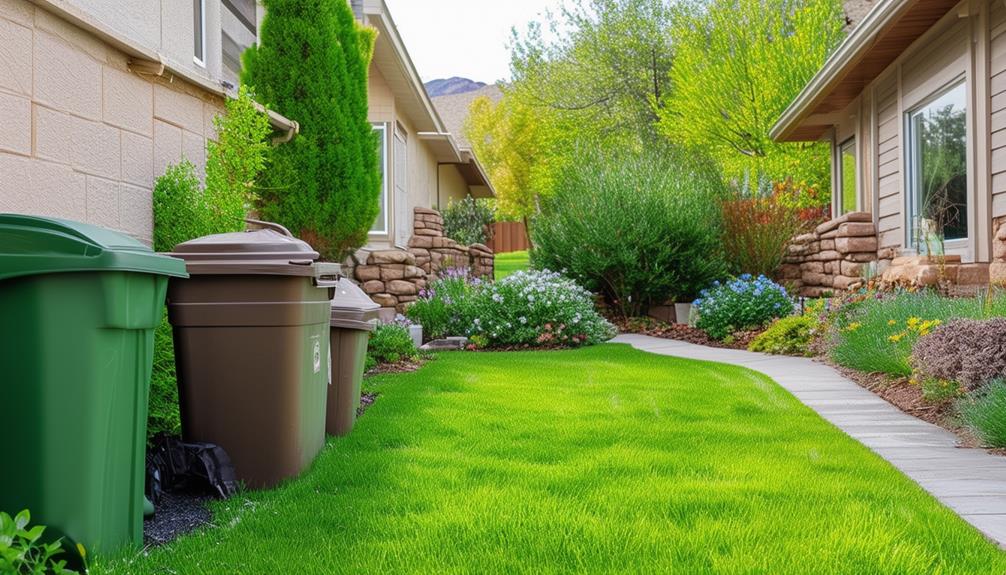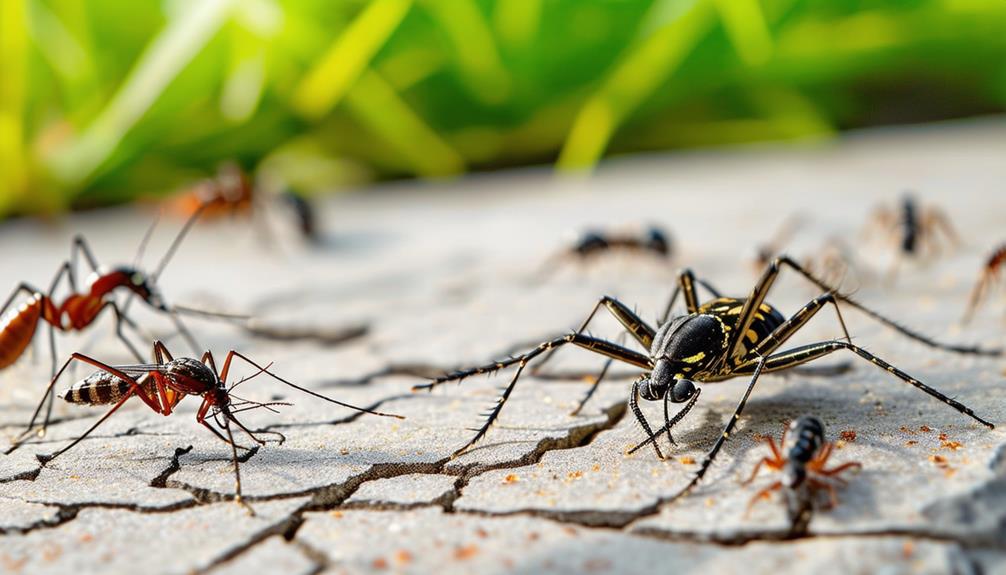Maintaining your Utah yard to keep pests away requires a proactive approach. By staying on top of lawn care and eliminating potential hiding spots, you can greatly reduce the likelihood of pests invading your outdoor space. However, there are additional strategies beyond the basics that can further enhance your pest control efforts. These methods not only help in pest prevention but also contribute to creating a more enjoyable and pest-free environment in your yard.
Key Takeaways
- Regularly mow and trim your lawn to deter pests.
- Remove standing water sources to prevent mosquito breeding.
- Seal outdoor trash cans tightly to avoid attracting pests.
- Trim back tree branches and shrubs to eliminate pest pathways.
- Implement natural pest control methods like planting insect-repelling herbs.
Importance of Regular Lawn Maintenance
Regular lawn maintenance is essential for creating a healthy turf that's less susceptible to pest infestations. Pest management plays an important role in maintaining a pest-free environment in your yard. By following proper lawn care practices such as mowing, watering, fertilizing, and aerating, you can promote strong grass growth, reducing the risk of pest damage.
Neglected or overgrown lawns can attract pests like rodents, insects, and weeds, leading to potential infestations. Removing thatch and debris from your lawn is crucial in preventing pests from finding shelter and breeding grounds. Trimming trees and shrubs near your lawn also helps prevent pests from accessing your yard and creating potential pest problems.
Trimming Bushes to Eliminate Hiding Spots
To effectively reduce pest hiding spots in your yard, prioritize trimming bushes regularly. Pests like spiders, ants, and rodents often seek shelter in overgrown bushes, making them a common source of infestations. By maintaining well-groomed bushes, you not only eliminate these hiding spots but also prevent pests from accessing your home easily. Overgrown bushes that touch your house can serve as a bridge for pests to move indoors, increasing the likelihood of encountering them inside. Properly trimmed bushes not only enhance the aesthetics of your yard but also reduce pest habitat considerably.
Pruning bushes also plays an important role in improving air circulation and sunlight exposure, which promotes the overall health of your plants. Better airflow and increased sunlight not only benefit the bushes themselves but also make the area less appealing to pests. By incorporating regular bush trimming into your yard maintenance routine, you can effectively minimize pest attraction and create a more pest-resistant environment.
Clearing Debris and Standing Water
To keep pests at bay in your Utah yard, it's important to clear away fallen leaves, branches, and other debris that provide hiding spots.
Regularly cleaning gutters and downspouts is essential to prevent water accumulation, as standing water attracts pests.
Fix any leaks promptly to eliminate potential mosquito breeding grounds.
Debris Removal Importance
Clearing debris and standing water in your Utah yard is essential to eliminate breeding sites and hiding spots for pests, such as mosquitoes, rodents, and cockroaches. Standing water attracts pests, increasing their activity in your yard. Regular debris removal maintains a clean, pest-free outdoor environment, important for proactive pest control and yard upkeep. Follow the table below to understand the importance of debris removal:
| Debris Removal Benefits | Description |
|---|---|
| Eliminates Breeding Sites | Removing debris prevents mosquito breeding. |
| Reduces Hiding Spots | Clearing debris decreases rodent and cockroach hiding areas. |
| Prevents Pest Attraction | Standing water removal deters pests like mosquitoes. |
| Maintains Clean Environment | Regular debris removal ensures a tidy outdoor space. |
| Supports Pest Control | Proper debris removal is key for proactive pest management. |
Water Pooling Prevention
Regular maintenance of your yard in Utah plays an important role in preventing water pooling, a common attractant for pests like mosquitoes and termites. To effectively keep pests away, follow these essential steps:
- Clear debris and leaf litter regularly to eliminate water pooling.
- Check and empty containers that collect water to prevent breeding sites for pests.
- Ensure proper drainage by fixing leaks and maintaining functional downspouts.
Planting Insect-Repelling Herbs
Planting insect-repelling herbs such as basil, mint, and rosemary in your yard can effectively deter pests. These herbs emit aromatic oils that insects dislike, serving as a natural repellent.
Strategically placing these herbs around your outdoor space can create a barrier against common pests.
Herb Types for Repelling
To efficiently deter pests in your Utah yard, consider incorporating insect-repelling herbs such as basil, mint, and rosemary into your landscaping. These herbs release natural oils and scents that insects find unpleasant, effectively keeping them away from your outdoor space.
Here are three herb types known for their pest-repelling properties:
- Basil: Repels mosquitoes and flies with its strong aroma.
- Mint: Effective against ants, aphids, and beetles.
- Rosemary: Acts as a natural insect repellent, deterring mosquitoes and cabbage moths.
Planting these herbs strategically in your yard can help create a natural barrier against unwanted pests, making your outdoor experience more enjoyable.
Planting Locations for Herbs
Incorporate insect-repelling herbs strategically into your yard's sunny, well-drained areas to maximize their pest-deterring effectiveness. Plant herbs like basil, mint, and lavender in these locations to ward off pests effectively.
For herbs such as rosemary and thyme that prefer drier conditions, choose areas with less moisture for planting. Create herb gardens near outdoor seating spots or entry points to deter mosquitoes and flies efficiently.
Consider potting citronella grass or other herbs in containers on patios to naturally repel insects while enhancing your outdoor ambiance. Utilize raised garden beds or hanging planters for growing insect-repelling herbs, adding both functionality and visual appeal to your yard.
Maintenance Tips for Herbs
For best maintenance of your insect-repelling herbs, make sure to regularly water and provide proper sunlight exposure to encourage healthy growth and maximize their pest-deterring properties.
When caring for your herbs, consider the following tips:
- Water your herbs consistently to keep the soil moist but not waterlogged.
- Trim your herbs regularly to promote new growth and prevent overcrowding.
- Rotate your herb plants periodically to guarantee even sunlight exposure and prevent leggy growth.
Using Natural Bug Control Remedies
Utilize essential oils such as peppermint, citronella, and lemon eucalyptus as natural bug repellents to effectively deter pests from invading your Utah yard. Peppermint is known for repelling insects like mosquitoes, ants, and spiders. Planting mint around your yard or using peppermint oil can help in keeping these pests at bay. Citronella, commonly found in candles or torches, is excellent for creating a bug-free outdoor space as it repels mosquitoes and flies. Lemon eucalyptus oil is another powerful natural remedy, especially effective against mosquitoes and ticks. By incorporating these natural bug control remedies, you not only protect your yard from unwanted pests but also avoid the use of harmful chemicals. Below is a table summarizing the benefits of each essential oil:
| Essential Oil | Repels | Common Pests |
|---|---|---|
| Peppermint | Mosquitoes, Ants, | Mosquitoes, Ants, Spiders |
| Spiders | ||
| Citronella | Mosquitoes, Flies | Mosquitoes, Flies |
| Lemon Eucalyptus | Mosquitoes, Ticks | Mosquitoes, Ticks |
Incorporating Fans for Pest Control
When using fans outdoors, you can effectively deter flying insects like mosquitoes and flies. Fans create airflow that disrupts insects' ability to fly steadily, making it harder for them to land on you. Mosquitoes, being weak fliers, are particularly susceptible to the disruptive effects of fans, which can help keep them away from your outdoor gatherings.
Additionally, fans can assist in dispersing scents that attract pests, thereby reducing the overall appeal of your yard to insects. Here are some key points to consider when incorporating fans for pest control:
- Fans create airflow that hampers insects' flight patterns.
- Mosquitoes find it challenging to navigate in the presence of strong fan winds.
- Fans help to diffuse pest-attracting scents, making your yard a less desirable environment for insects.
Implementing Yellow Light to Deter Insects
To further enhance your pest control efforts outdoors, consider implementing yellow light as a deterrent for insects, leveraging their reduced sensitivity to this color spectrum. Yellow bug lights are specifically designed to emit light that is less attractive to insects, helping to minimize the number of bugs drawn to your yard. These lights provide illumination while reducing the presence of pests, creating a more pleasant outdoor environment, especially during the evening when insects are most active.
To better understand the benefits of using yellow bug lights, let's take a look at the following table:
| Aspect | Description |
|---|---|
| Attraction to insects | Reduced sensitivity of insects to yellow light makes them less attracted |
| Effectiveness | Yellow bug lights effectively deter mosquitoes and other flying insects |
| Illumination | Provides ample light for outdoor spaces while keeping bugs at bay |
| Outdoor environment | Helps in creating a bug-free environment, particularly during evening hours |
| Long-term benefits | Consistent use of yellow bug lights can notably reduce pest presence |
Creating a Pest-Free Outdoor Environment
Maintain a pest-free outdoor environment by implementing effective strategies to deter insects and minimize their presence in your yard.
- Use bug repellents like citronella candles or torches to keep mosquitoes at bay.
- Regularly clean your outdoor space by removing debris and clutter to eliminate hiding spots for pests.
- Make sure there's no standing water in birdbaths or containers to prevent mosquitoes and other insects from breeding.
Strategies for a Pest-Free Utah Yard
To effectively maintain a pest-free Utah yard, focus on implementing strategic practices that target common sources of pest infestations. Regularly mow and trim your lawn to reduce hiding spots for garden pests like rodents and insects. By keeping the grass short, you eliminate potential habitats for these unwanted visitors.
Remove standing water sources to prevent mosquito breeding and infestation in your yard. Mosquitoes aren't only irritating but also carry diseases, making it important to deny them a breeding ground. Make sure outdoor trash cans are tightly sealed to deter pests like ants, cockroaches, and rodents. These pests are attracted to food sources, so sealing the trash cans will help keep them at bay.
Additionally, trim back tree branches and shrubs to prevent pests from accessing your home easily. By limiting their access points, you decrease the likelihood of pests finding a way indoors. Implement natural pest control methods such as planting pest-repelling plants to create a barrier against unwanted insects. These plants can act as a natural deterrent, reducing the presence of garden pests in your yard.
Frequently Asked Questions
How Do You Keep Insects at Bay?
To keep insects at bay, you can rely on natural remedies. For example, plant insect-repelling herbs like basil, rosemary, and mint. Use lemon eucalyptus oil or citronella candles. Keep your yard clean and install screens.
When to Treat Lawn for Grubs in Utah?
To prevent grub infestations in Utah lawns, treat for grubs in late spring or early summer when they feed on grassroots. Look for wilting, browning patches to detect severe damage. Use imidacloprid or halofenozide for effective prevention.
How Do I Control Pests in My Lawn?
To control pests in your lawn, consider natural remedies like neem oil or garlic spray. Begin by identifying the pests and their damage. Implement targeted solutions based on the type of pest to effectively manage infestations.
Should I Spray My Yard for Bugs?
You should consider spraying your yard for bugs after identifying the specific pests present. Natural alternatives like eco-friendly or organic solutions can effectively control pests while minimizing harm to beneficial insects and the environment.




